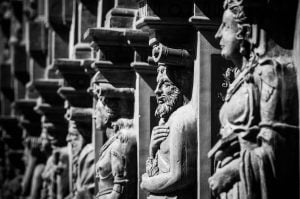
(Pexels – Pixabay)
When choosing electives during secondary school, your students get to choose their humanities: Geography, Literature, and History, but Social Studies is compulsory both in primary and secondary school.
Arguably, it can actually also be classified as part of the humanities since, when comparing them, History and Social Studies do have some relevance to each other.
In fact, this debate is quite common among students taking them.
Let’s take a better look at each of them and see how they differ in this article!
What Is History?

(Pexels – Pixabay)
History documents and studies events and people in the past.
The main purpose of the subject is to create discussions and debates about human life while maintaining a neutral view of all past happenings. It allows students to learn from and understand their predecessors.
In test exercises and examinations, students are required to analyse primary and secondary sources deeply and give their answers based on what they read and think.
These sources usually comprise documents, voice recordings, artefacts, and posters.
Now that we know more about History as a subject, let’s dive into some of the good and bad aspects of it.
Pros

(Pexels – Simon Sto FPV)
Better Understanding Of The Past
One of the best things about studying History is knowing more about historical events and experiences.
Students will be trained to put themselves in the shoes and minds of previous generations and comprehend the challenges they faced.
Through this, they will learn from past mistakes and successes, which can help them make better-informed decisions in the present and future.
Cultivates Critical Thinking
The subject itself basically trains students to apply their critical and analytical thinking skills and analyse several sources in order to draw conclusions.
These skills are useful in helping them solve their own problems as well as gain a better understanding of different issues.
Helps Preserve Cultural Heritage
Other than studying and understanding the past, students will also learn about different cultures, traditions, and customs.
They can then preserve them for our current generation and pass them down to future generations.
Cons

(Unsplash – Mr Cup / Fabien Barral)
Hard To Be Objective
Often, in the events portrayed, there can be several conflicting perspectives and views from different people.
This can form biases that make it difficult to objectively evaluate those events.
A Lot Of Memorisation Involved
One of the main complaints students have about the subject is that there’s often too much memorisation involved.
Things such as dates of events, names of people involved, and the events themselves are tested, and they are usually randomised so students have a hard time memorising all of them to score.
Irrelevance Of Some Topics
Some students complain that since History is about the past, they don’t see how some of the past events are relevant to their current lives.
This can make them lose interest in the subject.
What Is Social Studies?

(Pexels – Krizjohn Rosales)
Social Studies comprises several subjects such as History itself, Geography, Economics, Sociology, and Anthropology.
It mainly studies how society and the world live and work, as well as prepares students for life in a democratic society.
It covers more than just the past but also an understanding of the current social, cultural, economic, and political affairs of the world.
Similar to History, students will also be required to analyse information from different sources, evaluate it, and draw conclusions.
Now that we know more about Social Studies as a subject, let’s dive into some of the good and bad aspects of it.
Pros

(Pexels – Pixabay)
Global-Minded Individuals
Studying Social Studies enables students to understand more about the government and social issues happening all around the world currently.
This develops them into global-minded individuals who have a sense of duty to make the world a better place.
More Culturally Aware
Students will be exposed to different cultures, traditions, and groups of people from all around the world.
This makes them more culturally aware, as well as develop a sense of empathy and respect for them.
Students will also have broader perspectives with an open mind, which can help them in life.
Cultivates Critical Thinking
Similar to History, Social Studies also trains students’ critical and analytical thinking skills.
They will also be trained to analyse all sorts of sources and draw conclusions based on them.
Cons

(Pexels – Mike Chai)
Overload of Content
Similar to History, Social Studies also has an overwhelming amount of content to be studied.
Since it comprises many subjects, such as History itself and Geography, the content is too varied and too much.
Students may find it hard to handle and focus on specific topics.
Controversial Topics and Biases
There are several controversial topics that, like History, may also have biases.
Social Studies can involve discussions on controversial issues and historical events that may be presented with bias.
Educators must strive to present multiple perspectives to foster balanced and objective learning.
A Lot Of Memorisation Involved
Just like History, Social Studies also requires a lot of memory work.
Things such as dates of events, names of people involved, and the events themselves are tested, and they are usually randomised for Social Studies too, so students have a hard time memorising them to score.
Key Differences

(Pexels – Daniel Reche)
One of the most obvious differences is that History only focuses on past events, whereas Social Studies covers the past but goes more in-depth with the present society.
You can say that History provides the past events and perspectives to lead Social Studies in studying human behaviours and society, both past and present.
Social Studies incorporates not just History but other subjects, so it is generally more rounded and covers a broader scope of study.
Both subjects have their own benefits. So, students who are more interested in learning about detailed historical events and people would like History more.
And for students who are more interested in learning more about society and human affairs as a whole, they would like Social Studies more. However, they have to be prepared since both subjects require a lot of memorisation as well as training students’ critical thinking and analytical skills.
Conclusion

(Pexels – Gratisography)
Both subjects are different, yet they are also interconnected.
Despite their differences, History and Social Studies teach students about the world they live in, past or present, as well as help them become more prepared and knowledgeable individuals for the world.
Even though Social Studies is compulsory, students get to choose their humanities, so if they do not like this kind of learning, they could choose Geography or Literature instead.
If they are still unsure, help them consider what they want to learn as well as what their future goals are.
